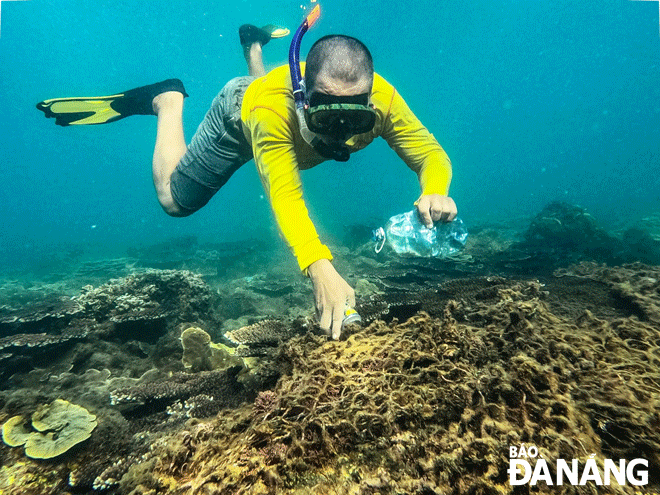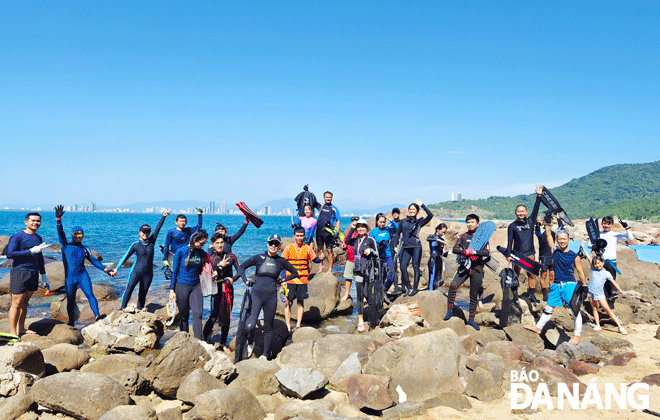Coral reefs are considered to be "undersea tropical forests", the common home of many marine species that need to be protected and preserved. Da Nang beaches wree naturally blessed with many beautiful coral reefs but their growth is affected by many different types of waste as well as diving activities for catching seafood. Many people who love the sea and nature have not hesitated to scuba dive to "rescue" coral, thus contributing to protecting the marine landscape and environment.

People participating in scuba diving to clean up trash on coral reefs need to have health and skills to ensure underwater safety. Photo: Hoai Thanh
Spread meaningful work
In Da Nang, Mr. Dao Dang Cong Trung residing in Nai Hien Dong Ward, Son Tra District is widely known as an "ambassador", someone who inspires and spreads beautiful actions for the natural environment.
Over the past 10 years, Mr. Trung has spent a lot of time picking up trash not only along the shore but also on the seabed. As a sea lover who often dives under the sea, Mr. Trung noticed that on the seabed there are also many types of plastic waste, nylon bags and broken fishing gear drifting and stuck on coral reefs off the Son Tra Peninsula.
Besides, there are still many impacts from fishermen catching seafood as well as tourists diving to visit coral reefs. If left for a long time, these impacts and the amount of waste will affect the habitat of corals as well as other marine species.
That fact prompted the man to bring propellers, diving goggles, supplies, pliers and scissors... to pick up trash on seabed. After scuba diving and scavenging alone, he realised that there was a lot of trash sinking in the sea while human strength was limited, and if he did it alone, it wouldn't be enough. He thought that it was necessary to spread this work to like-minded people.
Last June, Mr. Trung and swimmer Nguyen Thi Tra My, another resident residing in Son Tra District founded the group ‘DaNang Free Diving’ consisting of scuba divers to together protect and preserve the marine environment. Till date, the group has consisted of more than 2,000 members, including nearly 100 regular participants from different professions and different ages, including both professional and amateur divers.
One of the very enthusiastic participants in marine environmental protection activities is Mr. Huynh Hoai Thanh, a member of the Da Nang SUP Club. Born and raised in a coastal area, every time he dives, he saw a lot of trash in the sea, which made him very worried.
At first, he also collected trash alone but then he nand others who loved the sea formed a group and joined hands to clean up trash.
According to Mr. Thanh, the most difficult task is the removal of ghost nets, which are fishing nets that have been abandoned, lost or otherwise discarded in the ocean, lakes and rivers. These nets, often nearly invisible in the dim light, can be left tangled on a rocky reef or drifting in the open sea
Large nets cover corals for a long time, causing them to lack light and gradually die. Or sometimes, big waves pull these nets back and forth, which can break the coral. Therefore, removing these ghost nets requires divers to have skills in recognising dangers on the ocean floor (toxic aquatic species), underwater balance skills and navigation skills. Under water, when cutting the net, you must be gentle to avoid cutting or breaking the coral.
“A net stuck in coral requires many times of diving up and down, sometimes it takes up to 30 minutes to remove it all," Mr. Thanh said.
Like Thanh, Minh Huy from Nai Hien Dong Ward, Son Tra District, a student in the United States also spent last summer cleaning up trash on coral reefs. Huy said, when studying abroad, he learned scuba diving skills, went scuba diving and watched coral, but each trip like that was very expensive. While in Da Nang, his house is nearby the sea with very beautiful coral reefs, so why don't we join hands to preserve and protect them?
During the past 4 months of summer, Huy has created a habit for himself every time he goes to the beach, often bringing tools so that when scuba diving, he can take advantage of cutting the net and picking up all kinds of trash stuck in the coral.
“Da Nang has a diverse and beautiful coral ecosystem. Instead of having to go somewhere else to dive, why don't we preserve and protect the assets of our hometown so that every time we return, we have a place to play and enjoy? Furthermore, we can proudly introduce to friends and tourists near and far about the city's "assets", Huy said.

Volunteers participate in a scuba diving session to collect trash on the seabed. Photo: Trung Dao
Join hands to protect valuable assets
Mr. Trung shared that picking up trash on the seabed is not an easy task and not everyone can participate because of safety factors. Therefore, participants must equip themselves with the necessary knowledge and skills.
Mr. Trung himself is experienced in diving and has a certificate issued by PADI (the Professional Association of Diving Instructors), the most recognized dive training organization worldwide with 29 million certifications and counting. PADI Dive Instructors undergo rigorous training to ensure your scuba certification class is fun and safe.
Therefore, every time he organises a trip to collect trash in the sea, Mr. Trung actively guides the volunteers to engage certain skills. Mr. Trung always reminds the volunteers to do it skillfully so as not to break, affecting the growth process of corals as well as avoid negative impacts affecting the ecosystem of the sea because every year corals only grows about 1cm. In particular, net sections with growing coral spores should not be cut but must be kept to let the coral grow.
Thanks to the spread and careful preparation, the organized scuba diving and centralized trash collection trips of the Da Nang Free Diving group operate very effectively.
The most recent time was the trash collection trip at Nam beach in late August with the participation of 47 volunteers from all professions and different ages who collected more than 250kg of all kinds of trash.
The cooperation and contribution made by those who love the marine environment helped the coral reefs in Bai Nam and Hon Sup to be cleaned in the past summer. The practical, specific activities as well as the positive energy from the volunteers have spread strongly and are becoming more and more known.
"Diving to clean up trash is a selective activity. Many young people want to participate as volunteers, but not everyone can do it because it depends on their diving experience, operations, underwater skills, and physical condition. When you do something, others look and follow up. This is the most effective motivation measure. Perhaps that is why now the awareness of people and tourists when coming to Da Nang beach has also had many positive changes and their actions benefit the environment.”, Minh Huy from Nai Hien Dong Ward, Son Tra District said.
5 coral protection areas
As reported by Mr. Nguyen Duc Vu, the Head of the Management Board of Son Tra Peninsula and Da Nang tourist beaches, a project to protect coral reefs and marine ecosystems off the Son Tra Peninsula, there are 5 areas zoned for coral protection. They are Hon Sup with an area of about 26 hectares, average depth of 9m; Bai But with an area of about 20 hectares, an average depth of 10 meters; Nom Beach with about 48 hectares, an average depth of 12 meters; Luc Lo - Vung Da area with about 20 hectares, average depth is 12m; Bac (North) Beach with about 20 hectares, an average depth of 8 meters.
To protect coral reefs in the management area while ensuring the underwater environment off the Son Tra Peninsula area, the management board annually carries out the maintenance of the reefs as well as coordinate with border guards to patrol and warn of violations affecting coral reefs.
Reporting by Thu Ha - Translating by A.Thu